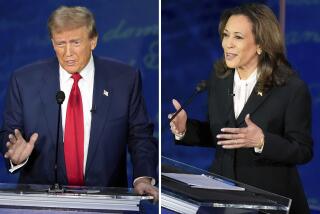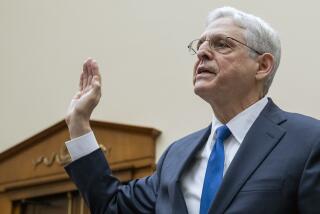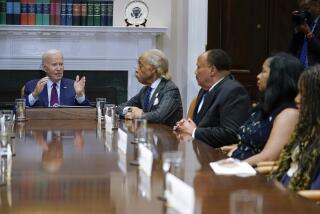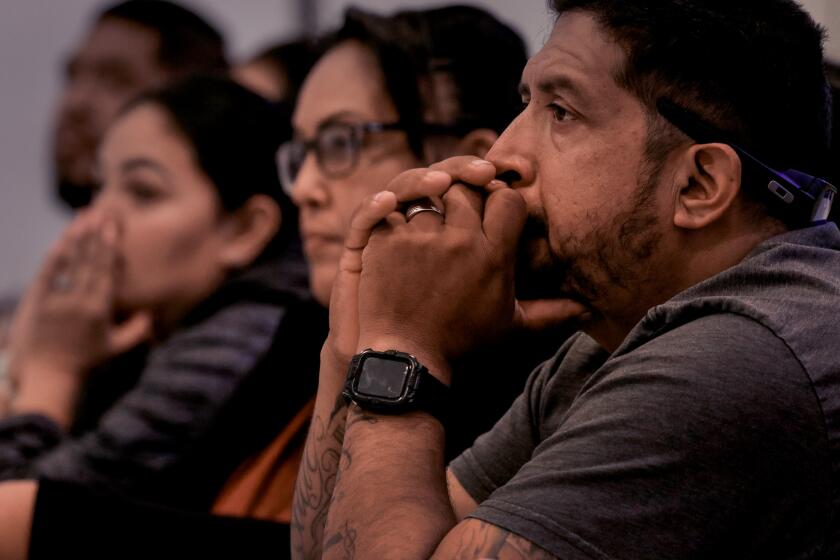Holder urges dialogue on race
WASHINGTON — For the last eight years, the Justice Department and the Bush administration were relatively quiet on the issue of race, its place within the social fabric of America and the enforcement of civil rights.
But on Wednesday, Eric H. Holder Jr., the nation’s first black attorney general, issued a provocative call to action to Americans in and out of government, saying the United States is “a nation of cowards” that urgently needs to begin confronting the issue of race relations before it polarizes the country even further.
“Though this nation has proudly thought of itself as an ethnic melting pot, in things racial we have always been and continue to be, in too many ways, essentially a nation of cowards,” Holder said in a speech marking Black History Month to hundreds of Justice Department employees. “It is an issue we have never been at ease with and, given our nation’s history, this is in some ways understandable. And yet if we are to make progress in this area, we must feel comfortable enough with one another -- and tolerant enough of each other -- to have frank conversations about the racial matters that continue to divide us.”
Civil rights activists welcomed the speech as an encouraging sign that the Justice Department under Holder and the man who appointed him, President Obama, will be an active one on issues that they said were largely neglected during President Bush’s two terms in office, such as voting rights and workplace discrimination. Some conservatives, however, said that Holder’s rhetoric was overly confrontational and had the potential to polarize Americans on the issue of race even further.
In his speech, Holder urged people of all races to use Black History Month as an opportunity to discuss as honestly as possible the issue of race in all its forms, including education, their careers and why America is not truly integrated 50 years after some momentous civil rights victories such as desegregation.
Holder said Americans, through “learned behavior,” often consider race-related subjects to be off-limits, and that such a mind-set has fostered a society in which the workplace is integrated but where there isn’t much significant interaction between whites and blacks in social settings.
“On Saturdays and Sundays, America in the year 2009 does not, in some ways, differ significantly from the country that existed some 50 years ago. This is truly sad,” Holder said. “Given all that we as a nation went through during the civil rights struggle, it is hard for me to accept that the result of those efforts was to create an America that is more prosperous, more positively race conscious and yet is voluntarily socially segregated.”
Mary Frances Berry, the former chairwoman of the U.S. Civil Rights Commission, said: “When I heard it, I called over there and told them to tell Eric that I thought it was a gutsy speech, a timely speech. It was very gutsy for him to come out and talk about race in a way that Obama doesn’t.”
In some ways, Holder’s speech touched on some of the same issues that Obama did in his landmark address last year on race relations, in which he said Americans suffered from a “chasm of misunderstanding that exists between the races.”
But Obama has since said little about the issue of race, and whether he intends to address such issues as racial inequality and social justice now that he is president. Holder implied that he plans to do so as the nation’s top law enforcement official. Addressing his remarks to his Justice Department subordinates, Holder said the nation “must do more, and we in this room bear a special responsibility.”
“Through its work and through its example this Department of Justice, as long as I am here, must and will lead the nation to the ‘new birth of freedom’ so long ago promised by our greatest president,” Holder said, referring to Abraham Lincoln. “This is our duty and our solemn obligation.”
Joe Hicks, a black Republican and the former executive director of the Los Angeles City Human Relations Commission, chastised Holder for his comments, saying they were incendiary and an inaccurate portrayal of a nation whose civil rights accomplishments could not have been won without the hard work of both black and white activists.
“Here’s the first black attorney general appointed by the first black American president,” Hicks said, “and he’s espousing views that appear to be almost ultra-left in their approach to race in America -- that blacks are victims and whites are intolerant and accepting of quasi-racist views.”
--
More to Read
Get the L.A. Times Politics newsletter
Deeply reported insights into legislation, politics and policy from Sacramento, Washington and beyond. In your inbox three times per week.
You may occasionally receive promotional content from the Los Angeles Times.










